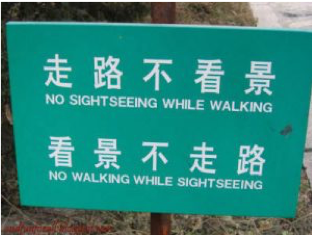The leisure industry is broader than you might think. According to Educalingo: ¨The leisure industry is the segment of business focused on entertainment, recreation, and tourism related products and services¨. Which means that: film, music, media, attractions, cultural events, the night economy, sports, vacations, hospitality, transportation and many more sectors are part of the leisure industry.
In 2019, the worldwide leisure travel market was valued at $1,006.5 billion, with a forecast of $1,737.3 billion by 2027. This reflects the growing importance of the market. This growth is related to the increasing globalisation we are facing.
In this article we will explain the importance of quality translations for this particular industry. Furthermore, examples of blunders and their consequences are described.

Why should you translate your content?
There are many reasons why it is important to translate your content when you are an actor in the leisure industry. Below five of the most vital reasons why you should translate your content are described.
1- Customers will be able to discover you more easily
Let’s face it, the leisure industry is overburdened. You want potential clients to be able to find you easily within a sea of competition. One of the most effective methods to achieve this is to appropriately translate your material. Consumers will be provided with a list of results in their native language when they use search engines, therefore if you want to attract travellers or sport fans, for example, your website should be in their native language as well.
2- Trust is boosted by professional translation
According to a 2013 survey, people are more inclined to book through websites with better language and spelling. Websites with poor translation might appear amateurish, leading customers to wonder whether other aspects of the service would be missing as well.
3- Traveling necessitates a significant financial expenditure
Unless you are simply driving down the road, most vacations can be rather costly. Flights must be booked, hotel rooms must be reserved, and excursions must be planned, all of which may quickly add up. If your website’s badly translated material leaves potential clients concerned, they are unlikely to give you their credit card information.
4- Travelers may be put off by language problems
While expecting everyone on earth to speak your native language is unreasonable, many customers prefer to know that the firm they book with has at least a basic understanding of their language. Because language difficulties can make individuals feel uncomfortable and make it hard to enjoy a vacation or festival, potential clients must be reassured.
5- Customers are not the only ones who value it
If you work in the leisure industry, you will almost certainly be talking with sellers from other countries. Package vacations, in particular, will necessitate coordination. As a result, you will not solely require translation but also interpretation services.
6- Translation blunders and their consequences
The issue with automatic translation is that it simply cannot be guaranteed to be correct. As a result, there are significant risks associated with its use.
Professional translation, on the other hand, entails human translation and the involvement of several people in the content creation process. It is the safest option! It is also critical in the leisure industry, as it is in most other businesses.
This is particularly important since travelers who do not understand the local language will almost certainly be forced to rely completely on their mother tongue during their stay in another nation.
Take, for example, signs. As simple as they may appear, they are frequently difficult to localise, resulting in issues that may only be avoided by utilising expert translation.
Finding yourself in front of this sign might be amusing, but it can also be perplexing:
The leisure business is filled with such mishaps, which are more often than not destructive rather than amusing. Professional leisure translators, who are masters in specialised language and jargon, would never have allowed anything like this to happen!
Benefits of professional translations in the leisure and tourism industry
Catalogues, brochures, and websites, as well as menus, pamphlets, and signs, are all examples of leisure-related material.
Print products are still frequently utilised for information and promotion, but the internet is currently the most important resource for travelers.
Despite the fact that English is a worldwide language, it has been demonstrated that travelers feel more at ease during the early planning stage when they can study and collect information about their location and organise their vacations or other trips in their own language.
Customers prefer to peruse webpages with content in their original language, according to studies, and approximately half of them would pay extra if given information in their mother tongue.
It appears that translation has become an unavoidable requirement in the leisure sector. However, large corporations are becoming increasingly enticed to use automated translation to meet this demand. But this method is not your best option.
What are the main problems for machine translation?
1. Expenses
When compared to professional translation, automated translation may appear to be less expensive at first, but in the long term, this technique does more harm than good, and organisations may wind up spending much more than they would have if they had selected professional translation from the start. This is true of content designed to disseminate information, such as signs (as mentioned above), as well as leisure websites and brochures. The customised content you have carefully produced for your website will only sound as attractive and correct in the target language if it is professionally translated.
2. Search Engine Optimisation
Another important factor is the capacity to produce high-quality translations that are also SEO-friendly. Localising travel websites in this way can help to enhance online exposure and revenues.
Is it not pointless to translate your content into another language if Google penalises you and makes your website less visible than others? Only with the assistance of experienced translators, who will do keyword research while utilising their language abilities, can travel information become appealing to a new audience while being among the top Google search results.
Conclusion
In our increasingly globalised world, the leisure sector is doing well, but global success can only be reached if firms can reach all clients, regardless of their native language. As a result, translation is critical to the growth of this important industry of many nations’ economies.
Investing in professional translation ensures that you can satisfy the demands of your customers. This helps to confirm your company’s credibility, develop your brand in new regions, and pave the way for a successful growth.







